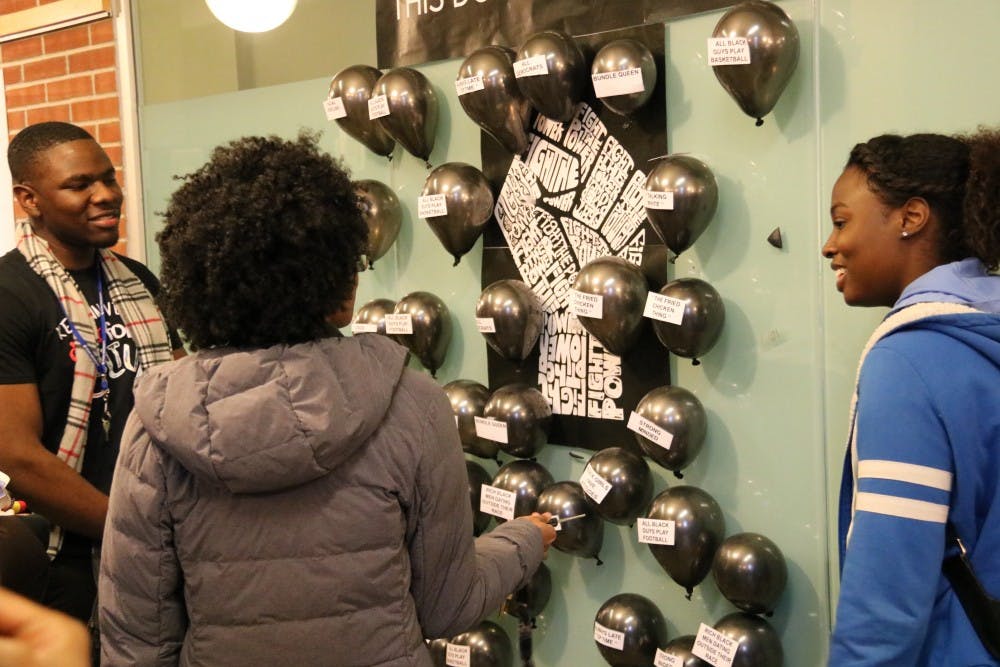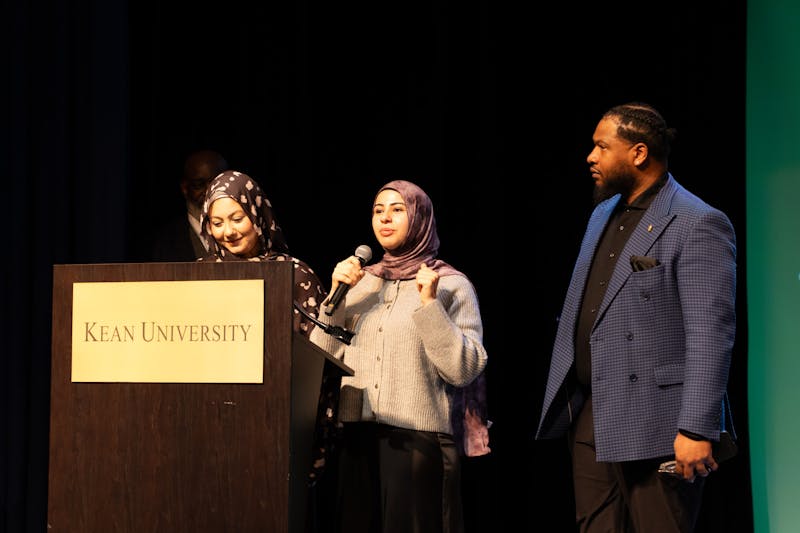Every February, the United States of America celebrates Black History Month to remember both the past and present struggles and accomplishments of the African American community. On Thursday, Feb. 1, 2018 Kean University started the commemoration with a flag raising ceremony by the Pan-African Student Union (along with the Office of Africana Studies's Director James Conyers, Ph.D.) and later the Black History Month Kickoff event hosted by the Office of Student Government's PULSE.
At about 3:15 p.m. a crowd gathered outside of the Miron Student Center to witness the symbolic raising of the Pan-African flag along with the American flag by the Pan-African Student Union. Pan-African Student Union President Oluwakemi Alade was the first to remark on the importance of the month as being in part to remember the continued struggles of the African American community. She recognized the long list of deceased African Americans who were killed unjustly for the color of their skin and addressed the need to continue to remember the fallen and one's roots in the continued push for justice and African American empowerment.
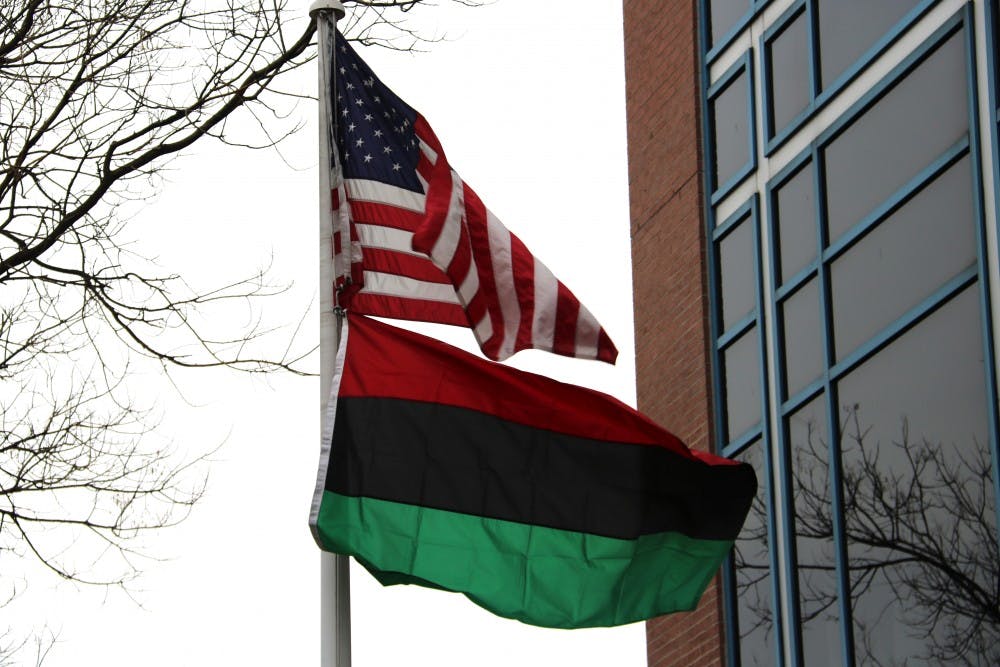
Alade declared the symbolism of the colors of the Pan-African Flag as so: red was for the blood shed by Pan-African ancestors, black represents the people themselves and green is for the growth and natural fertility of Africa. The end of her powerful speech marked the start of the raising of the Pan-African flag along with the American flag. This was then followed by a moment of silence.
Afterward, a speech by the Office of Africana's Director Conyer, Ph.D. then addressed the importance of African Americans to not only just celebrate Black History Month, but to also consistently celebrate their roots and themselves everyday of their lives. Conyers explained and emphasized that an African American's reluctance in educating themselves about their history comes from the "mental bondage" created by colonial powers. This mental bondage was meant to instill shame and feelings of inferiority and indifference to one's African culture.
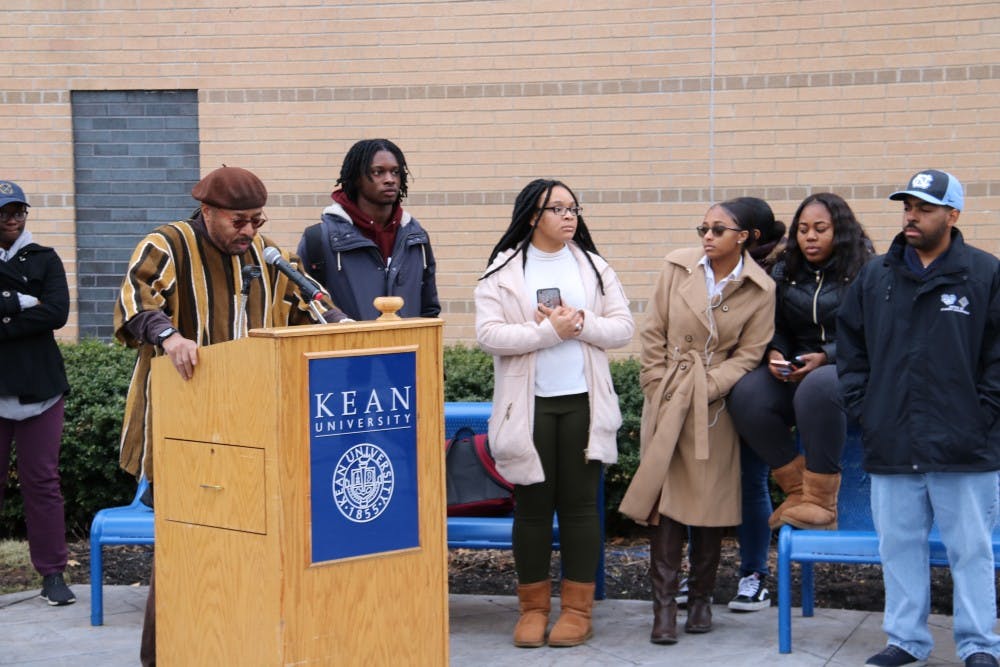
Conyers reflected on the errors made by some African American's who choose to forget their African heritage by saying, "You haven't stopped being African because you live here. You are an African and that's a part of what you lost that makes you think that your history started here and that you have no connection to the African continent."
He remarked that this error is in part a result of both mental bondage and one's reluctance to reeducate themselves. He then ended his empowering speech with a push for students to empower themselves through education, so that their acquired knowledge would then be a protective barrier against the injustices and wrongdoings of the world as well as to liberate one's mind and a cause for the betterment of the nation.
After the conclusion of Conyers's speech, the crowd was invited to move to the Humans Rights Institute to partake in the Office of Student Government's PULSE's Black History Kickoff event.
Upon entering, guests would've first noticed Susan Figueroa stationed at a table ready to explain the need for a more diverse selection of blood from different races at blood centers. She emphasized the importance of all races to donate as being that some people may have certain antigens that may match perfectly with someone from the same race. An antigen is a protein that rests on the surface of a red blood cell. It is important that the antigens of a receiver matches that of the donor so that the receiver's body does not reject the blood and fall ill.
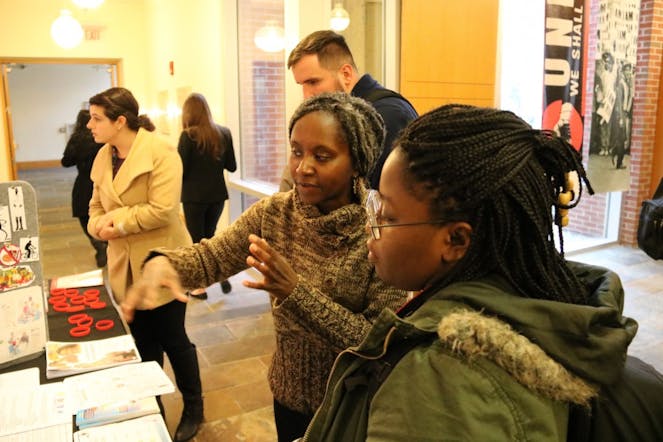
Caroline Smith, nurse practitioner for Kean University's Health Services
Next to Figueroa was Caroline Smith, a nurse practitioner and representative from Kean University's Health Services Department. She created a poster board featuring some African American pioneers of medicine. These pioneers included Mary Eliza Mahoney, Daniel Hale Williams, Ph.D., Rebecca Lee Crumpler, Ph.D., and James McCurie Smith, Ph.D., all of which were the first of their kind. Smith then revealed some of the health issues that most frequently affect African Americans such as hypertension, diabetes, and high cholesterol. She went on to explain some causes as well as some preventive things anyone can do to avoid these health issues.
When asked what pushed her to make this presentation specifically in light of Black History month, Smith remarked, "Well, I'm a nurse practitioner and I work at Health Services. Seeing as this is about African American history, I think it is very important that while we educate ourselves about the contributions of African Americans that we also look at our health because that's one thing financially–sometimes we can't afford it. Some people don't have medical care, and some people are just not educated about the risk factors that support these diseases–that may set us apart."

Following Smith's table was a wall of black balloons with stereotypes for African Americans. PULSE workers encouraged guests to pop any balloon that held a stereotype that they disliked. Some of these stereotypes included, "the fried chicken thing," "depends on government", and "all black guys play basketball." All throughout the event balloons continued to be popped, voiding each inaccurate stereotype, at the hands of those who were deflated by them.
Across from the balloon wall was a spin wheel. This spin wheel was perhaps the most popular activity of the event. Students spun the wheel, got a question and would then have the chance to win the prize of a black shirt with the statement, "Kean University do it for the culture." Adjacent to this activity was a back drop of magazine covers of African American celebrities over time that was meant to celebrate black power and African Americans in history. Some of these magazines included Time Magazine, Essence, and Jet. Students were encouraged to take Polaroid pictures in front of the backdrop. Beside the backdrop was a beaded jewelry making station. There were black, green, red and carved wood beads. Students could create bracelets out of the beads, resembling those of traditional African jewelry. Finally, the Black History Kickoff offered a table with some soul food like chicken, mac 'n' cheese and catfish.
This event was put together largely in part by PULSE coordinator, Jessica Yeldell. When asked what motivated her to create the event, Yeldell revealed how she wanted to represent black history and culture as being more than just the Martin Luther King, Jr. and Rosa Parks students are repeatedly taught in school. She wanted to more accurately convey black culture with the activities featured at the kickoff.
The Black History Kickoff was certainly a success as was vindicated by the overcrowding of the hallways and long lines to various activities. When questioned about the popularity of the event, Yeldell expressed her excitement upon seeing the large turn out of people coming to enjoy themselves and how she herself was happy and proud to be part of the creation of the event.
This first day of Black History month commemorations showed people's enthusiasm to honor their heritage. It is clear from the turn outs of both the flag raising ceremony and Black History Kickoff that Black History month remains a necessity to motivate, educate, and celebrate African American people and their culture.


